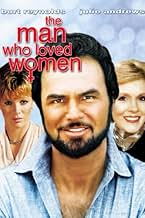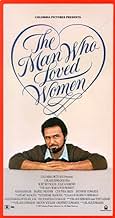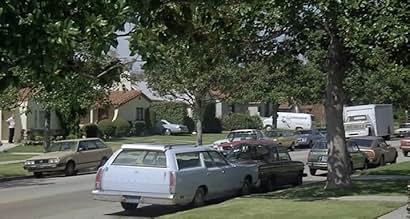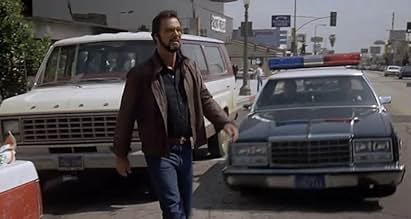VALUTAZIONE IMDb
5,3/10
2627
LA TUA VALUTAZIONE
Aggiungi una trama nella tua linguaA womanizing sculptor named David goes to seek help from a psychiatrist, Marianna, to cure him of his obsession with women.A womanizing sculptor named David goes to seek help from a psychiatrist, Marianna, to cure him of his obsession with women.A womanizing sculptor named David goes to seek help from a psychiatrist, Marianna, to cure him of his obsession with women.
Herb Tanney
- Doctor
- (as Schweitzer Tanney)
Trama
Lo sapevi?
- QuizFirst of two movies that Kim Basinger made with writer, producer, and director Blake Edwards. The second being Appuntamento al buio (1987).
- BlooperReflected on the back window of David's car, after he crashes it into a tree.
- Citazioni
Agnes Chapman: You're a fast worker. I better leave before one of us gets pregnant.
David Fowler: I'm not that fast.
- Colonne sonoreLittle Boys (theme song)
Music by Henry Mancini
Lyrics by Alan Bergman & Marilyn Bergman
[Played over the closing credits]
Performed by Helen Reddy
Recensione in evidenza
The title of 1983's "The Man Who Loved Women" tells you everything you need to know: Burt Reynolds plays David Fowler, a man who sees the beauty in practically every woman and therefore can never settle down with one. As such, he ends up isolated and on the couch of a therapist, Marianna (Julie Andrews). The entire movie consists of Marianna trying to figure David out and help him while the latter relays several of his amorous connections in flashback. When the therapy is over will THEY start a relationship? Fowler's many women include Kim Basinger, Marilu Henner and Denise Crosby.
I encourage you to read Nsouthern51's review from April 25, 2001, on IMDb because it expertly interprets and evaluates the movie. While the film could be considered a romantic comedy it's also a tragic study of a Romeo and therefore there's a pall of melancholy despite the light tone and amusing elements, including black comedy. Speaking of which, while I don't think adultery's something to take lightly and therefore don't find it very amusing, it ties into Fowler's folly and blindness due to his weakness, women.
The good thing is that Fowler's not all bad or unlikable (Burt is his typical amiable self in an atypical role). He's not the conventional lothario who uses and abuses; he genuinely loves women and is fascinated by them. He loves them so much he can't bear to be with just one because that would mean he'd never know hundreds or thousands of others, but then he aches because he doesn't want to hurt the women he leaves.
The best part is Fowler's salvation of a new-to-the-trade prostitute whom he ends up hiring for his sculpting business. He nobly resists acting on his carnal instincts and therefore sacrifices for her good. The girl is played by a pre-Star Trek (TNG) Denise Crosby and she looks great.
At the end of the day the movie features Reynolds in an unusual role, which might turn off fans, and the strange mix of melancholy and amusement may turn-off others. It's not great, but it's good enough for what it is and therefore worthwhile. It's similar to Altman's "Dr. T and the Women" (2000) so if you don't like that movie you probably won't like this one.
The film runs 110 minutes and was shot in Houston, Texas, and Los Angeles, CA.
GRADE: B-
I encourage you to read Nsouthern51's review from April 25, 2001, on IMDb because it expertly interprets and evaluates the movie. While the film could be considered a romantic comedy it's also a tragic study of a Romeo and therefore there's a pall of melancholy despite the light tone and amusing elements, including black comedy. Speaking of which, while I don't think adultery's something to take lightly and therefore don't find it very amusing, it ties into Fowler's folly and blindness due to his weakness, women.
The good thing is that Fowler's not all bad or unlikable (Burt is his typical amiable self in an atypical role). He's not the conventional lothario who uses and abuses; he genuinely loves women and is fascinated by them. He loves them so much he can't bear to be with just one because that would mean he'd never know hundreds or thousands of others, but then he aches because he doesn't want to hurt the women he leaves.
The best part is Fowler's salvation of a new-to-the-trade prostitute whom he ends up hiring for his sculpting business. He nobly resists acting on his carnal instincts and therefore sacrifices for her good. The girl is played by a pre-Star Trek (TNG) Denise Crosby and she looks great.
At the end of the day the movie features Reynolds in an unusual role, which might turn off fans, and the strange mix of melancholy and amusement may turn-off others. It's not great, but it's good enough for what it is and therefore worthwhile. It's similar to Altman's "Dr. T and the Women" (2000) so if you don't like that movie you probably won't like this one.
The film runs 110 minutes and was shot in Houston, Texas, and Los Angeles, CA.
GRADE: B-
I più visti
Accedi per valutare e creare un elenco di titoli salvati per ottenere consigli personalizzati
- How long is The Man Who Loved Women?Powered by Alexa
Dettagli
- Data di uscita
- Paese di origine
- Sito ufficiale
- Lingue
- Celebre anche come
- The Man Who Loved Women
- Luoghi delle riprese
- Houston, Texas, Stati Uniti(Texas scenes.)
- Aziende produttrici
- Vedi altri crediti dell’azienda su IMDbPro
Botteghino
- Budget
- 12.000.000 USD (previsto)
- Lordo Stati Uniti e Canada
- 10.964.740 USD
- Fine settimana di apertura Stati Uniti e Canada
- 1.347.032 USD
- 18 dic 1983
- Lordo in tutto il mondo
- 10.964.740 USD
- Tempo di esecuzione1 ora 50 minuti
- Mix di suoni
- Proporzioni
- 1.85 : 1
Contribuisci a questa pagina
Suggerisci una modifica o aggiungi i contenuti mancanti

Divario superiore
By what name was I miei problemi con le donne (1983) officially released in India in English?
Rispondi




















